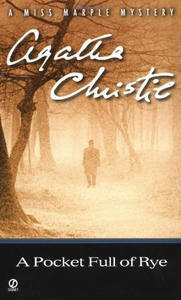“A Pocket Full of Rye” (1953) is a novel full of tropes, but I mean that in a good way. If the previous Agatha Christie books you’ve read have taught you the rules of the game, here is a chance to apply them. Then you can try to figure out whodunit, or simply enjoy the journey.
Household full of suspects
As usual, it starts with the murder of the patriarch of a large household of unlikable (on purpose, by Christie) Londoners. The author introduces us to colorful personalities, poisonings, motives, red herrings, a mysterious backstory in the Fortescue family, and a nursery rhyme.
It’s used more effectively here than in “The Mousetrap.” And then we find the answer is right in front us, yet I didn’t figure it out.

“A Pocket Full of Rye” (1953)
Author: Agatha Christie
Genre: Mystery
Series: Miss Marple No. 6
Setting: London, 1953
As with other novels from around this time, the cultural transition is noticeable. The seven Fortescues – whom Christie often calls Mr. or Mrs. or Miss Fortescue in dialog, thus causing me to page back to the dramatis personae – occupy a house so large that people don’t cross each other’s paths all that much.
Miss Ramsbottom, the sister-in-law of murder victim Rex Fortescue, is a recluse in an isolated room who unfurls religious judgments. Son Percival Fortescue (whose characterization is easy to remember because he’s like Percy Weasley from “Harry Potter”) and his wife have a wing with their own entrance.
“Rye” is a rare book where many of the household staff get full characterizations. Christie satirizes the “butler did it” cliché. She portrays the butler like one of those off-page “tramps” that everyone (except the professional sleuths) initially assumes is the killer. (Because, after all, certainly no one in the household would’ve done it. Granted, they didn’t get along with Rex, but murder? And so forth …)
And she names the butler “Crump,” to top it off. He’s often drunk and unreliable, and only keeps his job because Mrs. Crump is an amazing cook.
Good help is hard to find
Christie taps into a trend similar to 2021’s Great Resignation. These old, large households are becoming less common, and it’s hard to find and afford good help to keep the place running.
Those who do choose the profession can do quite well for themselves; savvy housekeeper Mary Dove picks this line of work for the pay. Meanwhile, parlormaid Gladys Martin is not good at her job, but she keeps it because there’s no one better out there.
Although it has become less common by 1953, household help is so normal in the first half of the century that even Miss Marple has it. Christie rarely emphasizes this. But Marple enters “Rye’s” events out of concern for Gladys, who once worked for her.

Then, of course, she solves the mystery despite her worry that she’s not articulating her views well to Inspector Neele. He’s another of the thoroughly competent governmental detectives that reveals Christie’s trust in the profession. In my mind’s eye, I pictured Stephen Rea from “V for Vendetta” – thorough and professional, but lacking that ability to sift through complexities possessed by the Poirots and Marples.
“Rye” makes me reflect on the craftsmanship that goes into Christie’s best works. If you reconstruct it in reverse, there’s a crisp explanation for whodunit and why. But additionally, the red herrings all have good explanations behind them.
“A Pocket Full of Rye” does what’s familiar with panache. I’m stopping short of full marks only because it doesn’t do anything new or different. But as Christie readers, we don’t need that in every novel. Often the pleasures are in the comfortably familiar, especially when it’s done this well.
Every week, Sleuthing Sunday reviews an Agatha Christie book or adaptation. Click here to visit our Agatha Christie Zone.

